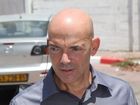The United Arab Emirates said on Wednesday it would delay the launch of its "Hope" Mars probe for a second time, again due to bad weather.
 Full Story
Full Story
The United Arab Emirates announced Tuesday the postponement of the launch of its "Hope" Mars probe due to weather conditions at Japan's Tanegashima Space Center.
 Full Story
Full Story
Daniel Gold, who led the team that invented Israel's Iron Dome missile defense system, has a history of safeguarding the country against what he identifies as existential threats.
 Full Story
Full Story
Mars may now be considered a barren, icy desert but did Earth's nearest neighbour once harbour life?
 Full Story
Full Story
The oil-rich United Arab Emirates has built a nuclear power programme and sent a man to space, and now plans to join another elite club by sending a probe to Mars.
 Full Story
Full Story
The six-decade space race to explore Mars has led to some 40 missions, at least half of which have been successful, and still the Red Planet inspires new adventures.
 Full Story
Full Story
Scientists in Italy are investigating the mysterious appearance of pink glacial ice in the Alps, caused by algae that accelerate the effects of climate change.
 Full Story
Full Story
A state-linked technology company in the United Arab Emirates has signed a partnership with two major Israeli defense firms to research ways of combating the coronavirus pandemic.
The agreement, announced late Thursday, comes just weeks after the UAE warned Israel that proceeding with its planned annexation of parts of the occupied West Bank would upend its efforts to improve ties with Arab states.
 Full Story
Full Story
Including astronauts, who have since the early space era found ways to do their business in near-zero gravity -- from the Apollo missions when waste management was, in NASA's words, "a plastic bag which was taped to the buttocks to capture feces," to the more advanced toilets of the International Space Station that use fan-driven suction systems.
 Full Story
Full Story
A new scientific study by Italy's national health institute ISS shows that mosquitoes are unable to transmit coronavirus to humans, the institute said Thursday.
 Full Story
Full Story



